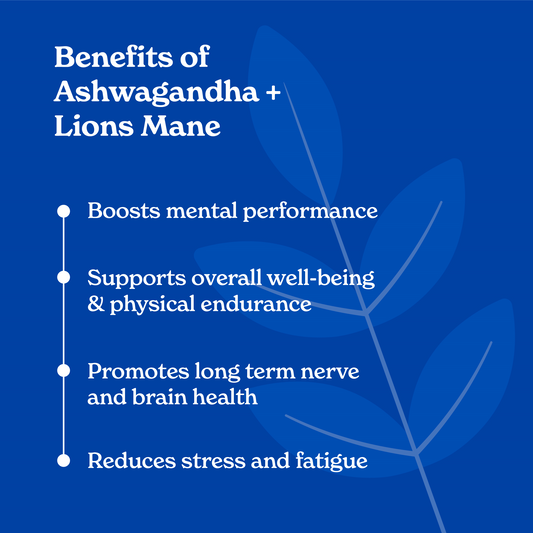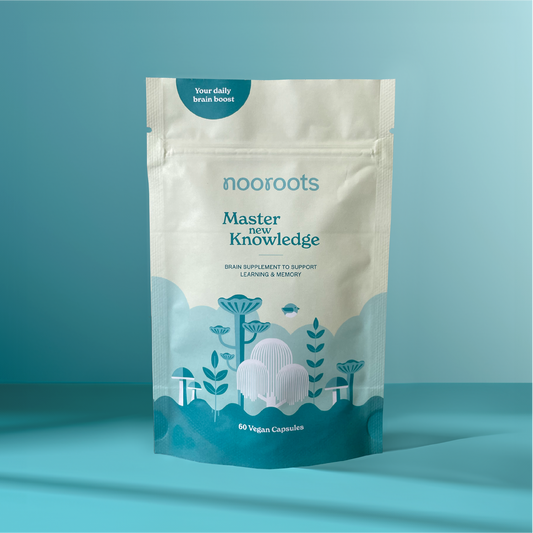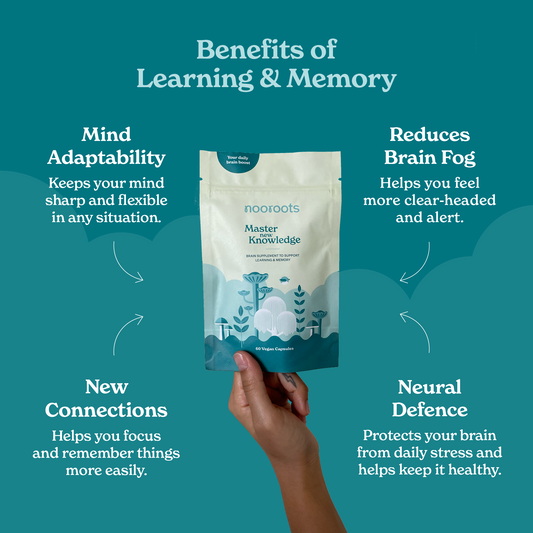Nootropics—commonly referred to as “smart drugs”—are compounds that enhance cognitive functions such as memory, focus, and mental clarity. In recent years, their relevance has expanded beyond cognitive performance to include potential roles in supporting mental health. Emerging evidence suggests that certain nootropics, particularly natural ones, may help modulate mood, reduce stress, and support the management of depression—a condition that affects an estimated 280 million people worldwide (World Health Organization, 2023).
Amid growing concerns about the side effects and limitations of conventional antidepressants, interest in natural nootropics has surged. Many of these compounds act through mechanisms that influence neuroplasticity, neurotransmitter balance, and inflammation—key factors implicated in depressive disorders.
This article examines how natural nootropics may contribute to mental well-being and support individuals experiencing symptoms of depression. It explores their underlying mechanisms, scientific evidence, and potential role as complementary options in a broader, more holistic approach to mood regulation and brain health.
Contents
- Understanding Depression and Natural Nootropics
- Top Natural Nootropics for Depression
- How to Incorporate Natural Nootropics into Your Routine
The Best Natural Nootropics for Managing Depression

Understanding Depression and Natural Nootropics
Depression is not simply a temporary feeling of sadness—it is a multifaceted mood disorder that affects how an individual thinks, feels, and functions in everyday life. Characterized by persistent low mood, fatigue, loss of interest or pleasure, difficulty concentrating, and disruptions to sleep and appetite, depression can significantly diminish quality of life and productivity. According to the World Health Organization, it is one of the leading causes of disability worldwide, underscoring its pervasive impact on individuals and society (World Health Organization, 2023).
At the biological level, depression involves complex interactions between neurotransmitters, hormonal systems, inflammation, and neuroplasticity. Imbalances in neurotransmitters such as serotonin, dopamine, and norepinephrine are known to influence mood, motivation, and cognitive function. Additionally, chronic stress and inflammation can impair the brain’s ability to form new neural connections, contributing to the persistence of depressive symptoms. Understanding these mechanisms provides insight into why effective treatment often requires more than symptom management—it calls for restoring the brain’s capacity for balance and resilience.
In this context, natural nootropics have gained growing attention as complementary tools in supporting mental health. Unlike conventional antidepressants, which typically target specific neurotransmitter pathways, natural nootropics often act more broadly to enhance overall brain function. Compounds such as omega-3 fatty acids, L-theanine, and Rhodiola rosea, for instance, have been studied for their potential to support neurotransmitter regulation, reduce oxidative stress, and promote adaptive stress responses.
While they are not substitutes for clinical treatment, these natural agents may offer supportive benefits—enhancing cognitive clarity, emotional stability, and the brain’s ability to adapt to stress—when used as part of a holistic approach to managing depression.
Top Natural Nootropics for Depression
Here we discuss some of the most effective natural nootropics for depression, detailing their origins, mechanisms of action, and the benefits they offer.
Ashwagandha (Withania Somnifera):
- History/Origin: This herb is a cornerstone of Ayurvedic medicine, revered for over 3,000 years for enhancing energy and improving concentration.
- Mechanism of Action: Ashwagandha acts as an adaptogen, meaning it helps the body manage stress. It does this by modulating the balance of neurotransmitters and stress hormones, notably cortisol.
- Benefits: Numerous studies point to Ashwagandha's effectiveness in reducing symptoms of stress and anxiety, thereby enhancing resilience to stress and aiding cognitive functions that are often compromised by anxiety.
Bacopa Monnieri:
- History/Origin: Known for its role in traditional Ayurvedic medicine, Bacopa Monnieri is celebrated for its ability to enhance memory and cognitive function.
- Mechanism of Action: The herb offers neuroprotective benefits, likely due to its antioxidant properties and its role in neurotransmitter system modulation.
- Benefits: It has shown promise in improving cognitive functions, with some studies noting its potential to alleviate anxiety and depression when used in conjunction with other treatments.
Iodine:
- History/Origin: Essential for proper thyroid function, iodine deficiency is linked to a variety of health issues, including cognitive impairments.
- Mechanism of Action: Iodine is pivotal for the production of thyroid hormones, which are crucial for brain function and mood regulation.
- Benefits: Adequate iodine intake is critical, especially during pregnancy and postpartum periods, with deficiencies linked to increased symptoms of depression and emotional distress.
Lion's Mane (Hericium Erinaceus):
- History/Origin: Utilized in traditional Chinese medicine for its benefits to neurohealth.
- Mechanism of Action: Promotes the expression of nerve growth factors, which support neuronal growth and function.
- Benefits: Considered a potential treatment for depressive disorders, its bioactive compounds might enhance neurotrophic factors, crucial for combating depression.
Curcumin:
- History/Origin: The principal active component of turmeric, curcumin is used extensively in Asian cuisine and traditional medicine.
- Mechanism of Action: Known for its potent anti-inflammatory effects, curcumin may also influence neurotransmitter levels and mood.
- Benefits: Meta-analyses and clinical trials suggest that curcumin can significantly improve symptoms of depression and anxiety, making it a useful adjunctive treatment.
L-Theanine:
- History/Origin: A unique amino acid found predominantly in green tea, known for its calming effects.
- Mechanism of Action: It modulates activity within neurotransmitter systems, aiding relaxation without sedation.
- Benefits: Shows potential for reducing depressive symptoms and anxiety, improving sleep disturbances, and boosting cognitive functions in individuals with major depressive disorder (MDD).
Rhodiola Rosea:
- History/Origin: Used across Europe and Asia for its adaptogenic properties.
- Mechanism of Action: Impacts various neurotransmitter systems and stress-response mechanisms.
- Benefits: Clinical trials highlight its efficacy in treating mild to moderate depression, showing significant improvements in symptoms with a good safety profile.
L-Tyrosine:
- History/Origin: A non-essential amino acid that plays a vital role in the production of dopamine, norepinephrine, and epinephrine.
- Mechanism of Action: Acts as a precursor for catecholamine synthesis, supporting neurotransmitter production, particularly under stress.
- Benefits: Enhances mood and cognitive performance under stress, maintaining optimal levels of crucial neurotransmitters.
Ginkgo Biloba:
- History/Origin: Among the oldest living tree species, Ginkgo Biloba has been used in traditional Chinese medicine for centuries.
- Mechanism of Action: Contains flavonoids and terpenoids that enhance blood circulation and protect neurons, potentially impacting mood regulation neurotransmitters.
- Benefits: Demonstrated to improve cognitive function and alleviate symptoms in elderly patients with depression, particularly when used as an adjunct to other treatments.
Vitamin B12:
- History/Origin: Essential for brain health and neurological function.
- Mechanism of Action: Critical for DNA synthesis and maintaining healthy nerve cells, B12 is vital for mood regulation.
- Benefits: Supplementation has been shown to significantly improve symptoms in depressed patients, particularly those with deficient B12 levels.
Vitamin B6:
- History/Origin: Essential for numerous physiological functions, including neurotransmitter synthesis.
- Mechanism of Action: Plays a crucial role in creating neurotransmitters that regulate emotional health.
- Benefits: Associated with reduced depression symptoms and is particularly vital for brain health in populations such as vegetarians, who may not get enough B6 from their diet.
How to Incorporate Natural Nootropics into Your Routine
Tips for Selecting High-Quality Supplements
When selecting natural nootropic supplements, choose reputable brands that provide full transparency about ingredient sourcing, dosages, and clinical evidence. Opt for standardized extracts and bioavailable nutrient forms, and verify that each product has undergone independent third-party testing for purity and potency. Look for certifications such as GMP, NSF, or ISO to ensure manufacturing quality, and avoid proprietary blends or unnecessary additives. Reputable brands should publish Certificates of Analysis (COAs) and comply with relevant regulatory standards to guarantee safety, efficacy, and integrity.
Recommended Dosages and Timing for Optimal Effects
The optimal dosage of a nootropic depends on the specific substance, its formulation, and the individual’s physiological profile. For instance:
- Ashwagandha (Withania Somnifera): 300–600 mg per day (standardized to 5% withanolides), taken in the morning or early evening with food.
- Bacopa Monnieri: 300–600 mg per day (standardized to 50% bacosides), taken in the morning with food; consistent use for 8–12 weeks enhances cognitive benefits.
- Iodine: 150 µg per day for adults (per WHO recommendations), ideally obtained through diet or supplementation if deficient; take with meals for best absorption.
- Lion’s Mane (Hericium Erinaceus): 500–1,000 mg per day (standardized extract containing 20–30% beta-glucans), taken in the morning or midday.
- Curcumin: 500–1,000 mg per day (standardized to 95% curcuminoids) with black pepper extract (piperine) for enhanced absorption, taken with meals in the morning or midday.
- L-Theanine: 100–400 mg per day, often taken with caffeine for synergistic focus and calmness; best taken in the morning or early afternoon.
- Rhodiola Rosea: 100–400 mg per day (standardized to 3% rosavins and 1% salidroside), taken in the morning about 30 minutes before breakfast.
- L-Tyrosine: 300–500 mg per day (or N-Acetyl-L-Tyrosine: 100–300 mg), taken 30–60 minutes before mentally demanding tasks or during stressful periods.
- Ginkgo Biloba: 120–240 mg per day (standardized extract containing 24% flavone glycosides and 6% terpene lactones), taken in the morning or early afternoon.
- Vitamin B12: 500–1,000 µg per day (as methylcobalamin), taken in the morning with food.
- Vitamin B6: 10–50 mg per day, taken in the morning with food.
For best results, these compounds are typically taken earlier in the day, when mental performance demands are highest and sleep interference is less likely.
Advising Consultation with a Healthcare Provider Before Starting Any New Supplement
Before beginning any new supplement regimen, consult a qualified healthcare professional to ensure safety and suitability. This is especially important if you have pre-existing health conditions, are pregnant or breastfeeding, or are taking prescription medications, as certain nootropics may interact with drugs or influence underlying health factors. A healthcare provider can help assess potential contraindications, recommend evidence-based dosages, and tailor supplement use to your individual physiology and cognitive goals.

Conclusion
Natural nootropics present a promising avenue for supporting mental health, particularly in the management of depression and mood regulation. While not a replacement for clinical treatment, these compounds may complement conventional therapies by enhancing neurochemical balance, promoting resilience to stress, and supporting cognitive function—all of which are often disrupted in depressive states.
Incorporating natural nootropics into a broader, holistic mental health strategy may offer added value for individuals seeking integrative approaches. When combined with established treatments such as psychotherapy, medication, exercise, and adequate nutrition, they have the potential to reinforce both psychological well-being and long-term brain health.
As scientific understanding of natural compounds continues to evolve, their role in supporting emotional balance and cognitive vitality may become increasingly significant—offering an evidence-informed, lower-risk adjunct to conventional mental health care.







